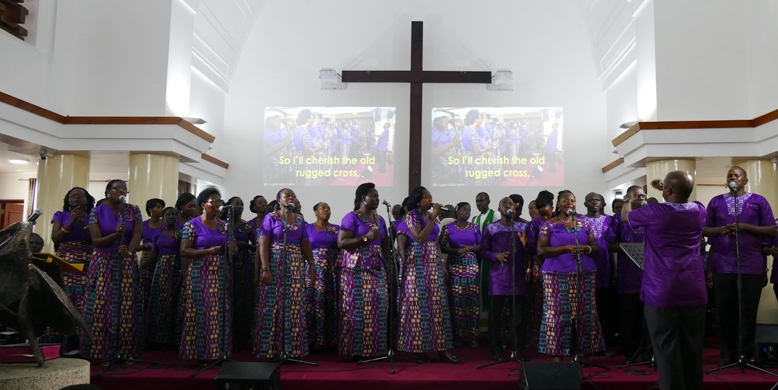On Sunday 9th July 2017, St. Francis faithful, invited guests and well-wishers assembled at Makerere University to praise, worship and thank the Almighty God for their newly refurbished and expanded sanctuary-the magnificent St. Francis Chapel. The Chapel’s capacity expanded from 450 to 1,350 seats per service.
Uplifted by the wonderful messages in the songs of praise, the congregation that filled both the St. Francis Chapel interior and gardens to capacity listened attentively to the Head-Laity Eng. Moses Kulabako who highlighted that the chapel extension project had lasted 14 months. The report on Chapel Finances, read by the Treasurer indicated that the total collections towards chapel expansion from 2012 to 30th June 2017 was UGX 2.315billion.
The Chaplain, St. Francis Chapel, Rev. Canon Amos Turyahabwe exalted the Almighty God for the ever growing congregation at St. Francis that resulted in the expansion of the chapel.

“For the past many months, the population has been growing, necessitating the introduction of three main English services at 7:00am, 9:00am and 11:00am and one special Lugbara service at 1:00pm. However despite this innovation the capacity of the Chapel was not sufficient to the extent that almost 50% of the congregation could either sit outside in the tent or under the mango tree and upstairs side aisles where they had no view of the existing chapel proceedings,” revealed the Chaplain.
The Archbishop of the Church of Uganda, The Most Rev. Stanley Ntagali congratulated St. Francis Community and Makerere University upon the successful completion of the Chapel extension project. He prayed to the heavens to bless St. Francis community, Chapel Council, Chaplain and the Makerere University family for generous contribution towards fulfilling God’s work.
“We are here today to celebrate the opening of this extended Chapel. Indeed, this is the day that that Lord has brought to us and we should be glad in it. As we rededicate this church, we need to thank Him for this far He has brought us. This has been greatly possible with your generous contributions. Those who will come after you will know that you did a great work,” he said.

Dedicating the expanded chapel to the Almighty God, Archbishop Ntagali said:
“Dear brothers and sisters in the Lord, now that we have completed building, let us dedicate this house and rejoice in its holy use, to the glory of God who has called us by grace, to the honour of Jesus Christ who loved us and gave up himself for us; and for the praise of the Holy Spirit who illuminates and sanctifies us…”
Archbishop Ntagali appealed to the St. Francis Community to always make good use of the facility, maintain its magnificent beauty and also remain supportive to the activities of the Church. He thanked Makerere University administration for supporting St. Francis and availing the Church with more space for expansion.
The Guest of Honour, Rt. Hon. Prof. Apolo Nsibambi who was represented by Prof. Edward Kirumira-Principal of the College of Humanities Social Sciences (CHUSS) re-echoed that he enjoyed the spiritual nourishment and grooming from St. Francis Chapel while a student and member of staff at Makerere University. He thanked the current and former chaplains and their pastoral teams for shaping university students into responsible citizens.

“It is now 56 years ago when I was here at St. Francis Chapel as a student, but also later as a professor of Makerere University. It was good for us because we would sit as a small number and listen to sermons, be mentored and prepared to be leaders of this nation. Now that the Chapel has been expanded to create more space, it is really great work worth celebrating since it will increase on the number of students who participate in church activities.” Prof. Nsibambi wrote.
He expressed his gratitude to the staff of Makerere University and the alumni who after their studies keep coming back to St. Francis as their church. He mentioned that it is their love and generous contributions that have given the Chaplain and the chapel council the morale to plan and be able to come up with structures such as the beautiful sanctuary that was being rededicated to God.
Prof. Barnabas Nawangwe, the Deputy Vice-Chancellor (Finance and Administration) on behalf of the Vice Chancellor Prof. John Ddumba-Ssentamu congratulated the St. Francis Community upon the wonderful achievement. He thanked the community and well-wishers for their enormous contribution towards the Chapel extension project. Prof. Nawangwe-a professional architect by training, applauded the Chapel technical committee chaired by Eng. Paul Ekirikubinza for coming up with magnificent architectural designs.

At the same occasion, Prof. Nawangwe who is also the Vice Chancellor-Elect thanked the Members of St. Francis Chapel for praying for him to reach greater heights. He vowed to selflessly serve the community during his tenure as Vice Chancellor.
The Chapel rededication service was attended by members of clergy, former chaplains of St. Francis Chapel, Makerere University staff, members of St. Francis Community, Makerere University students, invited guests and well-wishers. The colourful service was regularly punctuated by songs of praise from a number of teams including the Children’s Choir.
Rev. Canon Amos Turyahabwe also saluted his predecessors for their vision in running the affairs and the programmes of St. Francis Chapel. “We would like to thank God for them and we pledge our commitment to continue on the firm foundation that they started so that we are able to have a sense of continuity as a body of Christ.”
Article by: Mak Public Relations Office


 General16 hours ago
General16 hours ago
 General16 hours ago
General16 hours ago
 Humanities & Social Sciences2 weeks ago
Humanities & Social Sciences2 weeks ago
 General1 week ago
General1 week ago
 Agriculture & Environment2 weeks ago
Agriculture & Environment2 weeks ago


